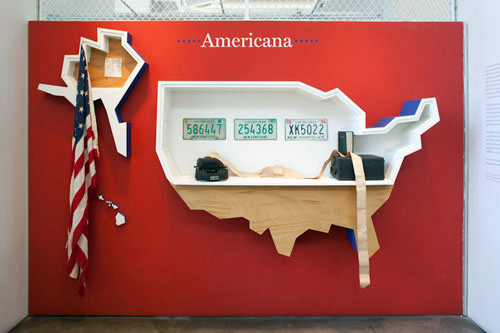Americana: New Hampshire
02 - 20 Mar 2010
AMERICANA: NEW HAMPSHIRE
The Fighting Words Doctrine: Chaplinsky v. New Hampshire
Mary Augustine Gallery | Mar. 2–20, 2010
In 1945, following WWII, the State of New Hampshire adopted the official motto Live Free or Die. This phrase, which appears on the official State license plate, is a powerful emblem of American pride and represents the philosophies behind the country's political tradition. The extreme nature of the phrase reminds us of the importance of civil liberties in the United States, in particular the right to express one's opinions and beliefs as protected by the First Amendment.
Chaplinsky v. New Hampshire constitutes a significant episode in New Hampshire's legal history, and an important precedent for cases regarding minority free speech rights in the United States in the 1960s and '70s. The case centers on the confrontation between local police and Walter Chaplinsky, a vehement Jehovah's Witness who preached the Scriptures at Rochester's Central Square in April 1940. Chaplinsky's words regarding the falseness of the Catholic Church, and in particular his attacks against the practice of flag salutation, unleashed public turmoil. The war veterans who overheard his insults tried to force him to salute an American flag. Due to his religious beliefs, he considered flag salutation an act of idolatry, so Chaplinsky refused. His apparent insult to the American flag, the ultimate emblem of national pride, especially in wartime, enraged the crowd. They attacked him, casting his body to the ground, between a gutter and a parked car. Chaplinsky, beaten and frustrated, was arrested by Rochester's police. Once at the station, he exploded in anger, calling them "god damn fascists" and "racketeers." His misbehavior led him to be charged with disturbance of the peace under a rarely cited law, the fighting words doctrine.
Fighting words are defined as utterances that incite hatred or violence from their target and, according to United States law, constitute a limitation to the freedom of speech as protected by the First Amendment. Chaplinsky appealed his sentence multiple times, bringing his case all the way to the Supreme Court; he was never vindicated. The trials never recognized the mitigating factors preceding Chaplinsky's offense, namely the violent intolerance of his beliefs. In 1942, he was convicted to six months in jail.
This Americana display assumes a legal aesthetic. It revisits Chaplinsky's case and attempts to explore from a historical distance the complexities and limitations of freedom of speech, the opacity of language, and the value of symbols in the history of the United States.
The Wattis would like to thank the New Hampshire Historical Society for permission to reproduce images for this exhibition.
Curated by Sharon Lerner
The Fighting Words Doctrine: Chaplinsky v. New Hampshire
Mary Augustine Gallery | Mar. 2–20, 2010
In 1945, following WWII, the State of New Hampshire adopted the official motto Live Free or Die. This phrase, which appears on the official State license plate, is a powerful emblem of American pride and represents the philosophies behind the country's political tradition. The extreme nature of the phrase reminds us of the importance of civil liberties in the United States, in particular the right to express one's opinions and beliefs as protected by the First Amendment.
Chaplinsky v. New Hampshire constitutes a significant episode in New Hampshire's legal history, and an important precedent for cases regarding minority free speech rights in the United States in the 1960s and '70s. The case centers on the confrontation between local police and Walter Chaplinsky, a vehement Jehovah's Witness who preached the Scriptures at Rochester's Central Square in April 1940. Chaplinsky's words regarding the falseness of the Catholic Church, and in particular his attacks against the practice of flag salutation, unleashed public turmoil. The war veterans who overheard his insults tried to force him to salute an American flag. Due to his religious beliefs, he considered flag salutation an act of idolatry, so Chaplinsky refused. His apparent insult to the American flag, the ultimate emblem of national pride, especially in wartime, enraged the crowd. They attacked him, casting his body to the ground, between a gutter and a parked car. Chaplinsky, beaten and frustrated, was arrested by Rochester's police. Once at the station, he exploded in anger, calling them "god damn fascists" and "racketeers." His misbehavior led him to be charged with disturbance of the peace under a rarely cited law, the fighting words doctrine.
Fighting words are defined as utterances that incite hatred or violence from their target and, according to United States law, constitute a limitation to the freedom of speech as protected by the First Amendment. Chaplinsky appealed his sentence multiple times, bringing his case all the way to the Supreme Court; he was never vindicated. The trials never recognized the mitigating factors preceding Chaplinsky's offense, namely the violent intolerance of his beliefs. In 1942, he was convicted to six months in jail.
This Americana display assumes a legal aesthetic. It revisits Chaplinsky's case and attempts to explore from a historical distance the complexities and limitations of freedom of speech, the opacity of language, and the value of symbols in the history of the United States.
The Wattis would like to thank the New Hampshire Historical Society for permission to reproduce images for this exhibition.
Curated by Sharon Lerner

